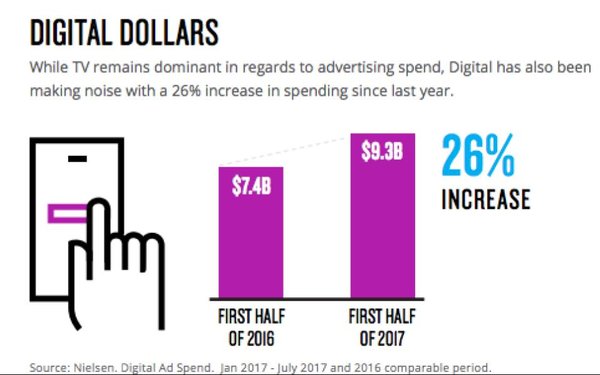Commentary
Digital Video Ad Spending Expands 7 Times The Rate Of Linear TV
- by Joe Mandese @mp_joemandese, October 3, 2017
On the cusp of the 2017-18 television season, Nielsen released an analysis indicating most of the video ad marketplace growth is coming not from linear TV, but from digital video ad spending.
“TV remains a major component in the advertising space,” reads Nielsen’s 2017 “Commercial & Advertising Update,” noting that $61.1 billion was spent on TV advertising last season.
That represents a 3.6% increase from the $59.0 billion advertisers spent on TV during the 2015-16 season, and tracks the overall expansion of the U.S. advertising marketplace.
Digital video ad spending, by contrast, has expanded 26% to $9.3 billion during the first half of 2017.

5 comments about "Digital Video Ad Spending Expands 7 Times The Rate Of Linear TV".
Read more comments >
Next story loading 




The one thing this report fails to acknowledge is that linear inventory is scarce and digital is not. So, it is no surprise that digital growth is outpacing TV. TV grew despite all the negative press about ratings - you must ask yourself why. One reason is that TV still works! More importantly though, we should remind ourselves and be sure of one thing - TV with the advent of addressability and cross device viewing is stronger than it has been in years and the more accountable and addressable it becomes, the more likelihood that "TV" begins to take digital dollars back.
Good point, Gabe. I am not so sure about the extent of digital ad revenue gains at the expense of TV. It seems to me that the biggest loser by far has been magazines--at least among general branding advertisers. TV, in contrast, continues to see moderate gains---excluding abberations caused by the periodic influx and out flows of Olympics and political spending.
Not to mention the law of large numbers....
Really, it's time we stop the us vs. them arguments when talking about television and "digital". Why is it always the TV people screaming, "TV still works!" Of course it does. No one says it doesn't. Even Nielsen will tell you TV and "digital" (whatever that means nowadays) work better together. After all, it's not about which one is better than the other; it should be about reaching the right audience to achieve the advertisers' objectives. Or, isn't it?
Jared, of course it's about reaching the right audience but that's one of the main issues here. Much of the propaganda we are being hit with would give you the impression that TV has virtually no reach among millennials, that "the eyeballs" are moving to digital, that Netflix has "disrupted" TV, that nobody watches commercials", etc, etc. and this nonsense is supported by the endless stream of the latest "ad revenue" tallies which naive innocents---and there are lots of out there in the marketing world, especially about media----- think signify a tidal wave of "ad dollars" deserting "legacy media" and pouring into to digital. Yep, there is movement but its extent is being vastly exaggerated by people who stand to gain if such a shift actually gains momentum.
I should also add advertisers with any degree of sophistication are concerned about the reach of their media buys and whether their ads can be seen as well as targeting. You can serve ads to a targeted person all you want but if half of them don't get to the target's screen and of those that do, another half are on-screen for only 1-2 seconds, this is not a good thing. Also, if you use programmatic platforms to buy digital media and doing so costs you half of your media budget when data manipulation and ad distribution costs are factored in---compared to 1-3% for legacy media----that, too, is a problem.
I happen to be a strong advocate of media mixing and I see many benefits in using TV and digital in complementary roles, so, in my case, it's notone against the other. But the propaganda, no matter what source it eminates from and what media it favors, needs to be evaluated and, if it is misleading, it must be challenged by objective observers.